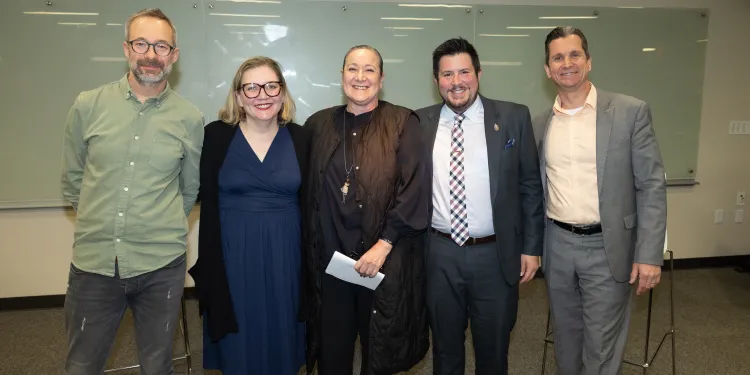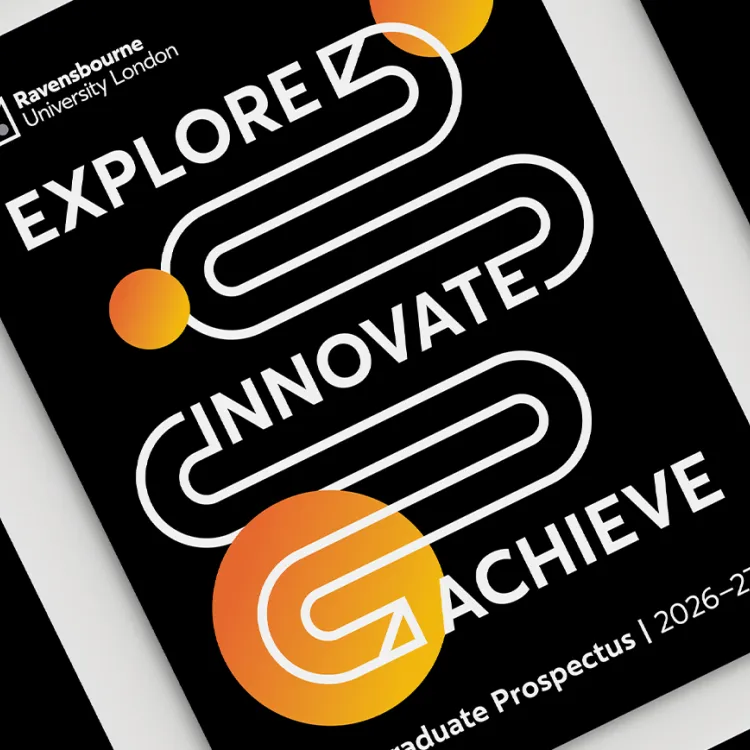Built for Industry: Danielle Coombs

For our next edition of Built for Industry, we spoke to strategist, communicator and Associate Professor at Ravensbourne University London, Dr Danielle Coombs.
Danielle’s areas of expertise centre on understanding people and audiences, with specific focus on sport, politics, society and fandom. As well as her Consumer Insights textbook, she has also had recent publications regarding the 2023 FIFA Women’s World Cup and the 2024 Olympic and Paralympic Games in Paris.
We caught up with Danielle shortly after she returned from the illustrious McGarr Symposium at the University of Texas at Austin.
Tell me a little bit about your academic and professional life up until joining Ravensbourne.
I grew up in Ohio in the US, so at my core, I’ve always been an Ohio girl. I started out going to university there and decided I was interested in understanding people and audiences. I got my degree in Television Production and went to Louisiana State University for my doctorate. While I was there, I realised I needed professional experience. I left when I was ABD – ‘all but dissertation’ – and took a job in New Jersey as Director of Election Research for the company that rebuilt exit polling after the 2000 election.
Then I took a job in New York City to work at Insight Research Group, where we did consumer insights and brand consulting. That was where I realised how creative research is. After finishing my doctorate, I got really into the World Cup. I’d gone from traveling all the time to having free time and, when the World Cup ended, I wanted to keep that going. The owner of my NFL team, the Cleveland Browns, had just purchased Aston Villa, and it had been a really successful purchase, unlike the purchases of Liverpool and Manchester United by Americans.
A super fan put me in touch with Charles Krulak, a non-executive director who was friends with [Villa owner] Randy Lerner. Chuck gave me open access to the club. My earliest academic research focused on foreign ownership and fandom in the Premier League. Eventually, I got married and had two kids and couldn’t keep coming over [to England], so the work shifted toward the NFL. That led to a re-theorisation of fandom – what I call ‘performative sport fandom’ – focused on gender and how women experience hypermasculine environments. That set the trajectory: a lot of what I’ve done since has been related to sports, politics, and the politics of sport.
If you had to point to one experience that shaped your work the most?
In that job in New York, people were making multi-million-dollar decisions based on our recommendations, so I had to harness my thinking effectively. I learned to lean into my strengths and stop trying to do everything, instead recognising what I’m good at.
Danielle quote
As an academic, I realised everything I do should have a purpose and make life better for someone or help understand an industry. There’s a lot of criticism that sports research isn’t ‘real’ research and that we’re ‘playing in the sandbox’. But sport brings joy, builds community and networks. Talking about Villa and football gives me access to conversations I wouldn’t otherwise have. Fan communities are essential to who we are, and they’re multi-billion-dollar businesses. We need to take them seriously. ”
Academia often separates high- and low-brow. Take Taylor Swift; she’s maligned, as if being a ‘Swiftie’ is a dismissive thing. But Taylor Swift is a machine. She’s built a community which is no joke. The Eras tour was incredible and yet it’s not taken seriously because it’s girls and women. I feel like the research I’m doing matters as a cultural artifact.
How do you push back against the idea that fandom or pop culture is less legitimate?
With athlete activists like LeBron James and Colin Kaepernick, who have been at the forefront of the fourth wave of athlete activism and social justice, people more readily see that work as legitimate. With fandom, it’s harder, because fandom of popular things is often looked down on. I make the case by highlighting the financial and cultural impact. Once I explain or argue it, people usually get it.
What was it about Ravensbourne that attracted you?
We came on a Saturday just to see the university. I walked out of the North Greenwich tube station on this glorious day, and the Ravensbourne building was right there. I thought, “I want to work here!” The vibes were immaculate. The more I looked, the more I liked it. I love what’s happening here. It’s not just about the traditional academia. It’s about impact on communities, and that’s such an important philosophy. It’s part of why Ravensbourne is doing well; it’s in a unique position.
Danielle quote
I’ve always worked at the intersection of business, creativity and technology, and that’s exactly how Ravensbourne is positioned. We’re going through terrifying and thrilling times with AI, machine learning, and huge societal shifts. Ravensbourne is well placed to think about what that will mean and how we can approach it thoughtfully. ”
How did media narratives shift from the Women’s World Cup in 2023 to the Paris Olympics in 2024?
There’s been a growing realisation that ‘if you build it, they will come.’ There’s always this idea that no one wants to watch women’s sports, but when you show it, people watch. When you invest, people want to see it. We’ve seen massive attendances and global audiences for women’s sports.
And with that recognition, we’ve seen changes in commentary. At the Olympics, for example, you hear more about the quality of the athletes, more attention to research into female physiology, and less focus on who their husbands or coaches are. There’s more overall recognition of women as elite athletes.
How damaging was what happened to Jenni Hermoso?
It was incredibly important because it revealed systemic problems within the Spanish REF. Even fans of the women’s game didn’t realise how bad things were. These women had just won the World Cup, and yet the story became about whether or not a non-consensual kiss from someone who had disrespected her and her teammates for years was ‘a big deal.’
It took women football players wearing armbands, the “Se acabó” movement for Jenni, to reinforce that we are on her side. She is the victim here, not him. The sustained media scrutiny put a critical lens on the Spanish federation. That was significant.
What about the case of Imane Khelif at the Paris Olympics?
Anyone who has a basic understanding of biology that goes beyond the simple matrix we are taught, at least in American schools, about how it works will know weird stuff happens with chromosomes. People are shaped differently and they have different things. My frustration is you look at Michael Phelps and part of the reason he was so extraordinary was because he was a genetic freak. He had massive hands, massive limbs, his physiology was what made him excellent. Should he not be allowed to participate? No one’s making that case. Khelif’s body serves her in this really powerful way to excel in the sport that she has chosen to do. The good thing is that you have a lot of athletes, especially cis women like Dawn Staley, speaking up about trans athletes and saying “just let them play.” There are ten trans athletes among thousands in US university sports. And yet places like Ohio passed legislation because of three trans girls.
All the data shows how vital sport is for community and belonging. It’s devastating that disingenuous actors hijack these conversations. Khelif was excellent at her sport and I’m glad the world rallied around her, but it’s devastating and unfair that her story became about her biology versus her excellence.
How do you deal with those persistent bad-faith narratives, even when they’re easily disproven?
That’s one of the greatest challenges of our time. Since Trump’s election, people talk about the ‘post-truth’ society. And as AI and deepfakes get better, it’s harder to know what’s real. That’s why places like Ravensbourne matter; to help understand the ethics, responsibility, and regulation around technology.
Tech has outpaced government regulation, and we’re at a crisis point. My hope is that we can develop tech-based solutions to these problems. We need STEM to be more connected to ethics and social impact. That business-creativity-tech nexus is exactly what Ravensbourne is built for.
What were your takeaways from the McGarr Symposium in Texas, and how do they influence your teaching?
Texas is one of the states actively trying to ban DEI discussions, so I talked about DEI right away, because that’s what global sport is.
In my classes, my students come from different backgrounds, but we find common ground through shared passions like sports and music. Those shared interests help us build connections. One thing I took from the symposium was to keep encouraging students to explore cultural impacts, the inherent politics of sport, and how all of that connects to business questions.
How do you see Ravensbourne students preparing for the demands of industry?
There’s a real opportunity to explore entrepreneurship. Many students in creativity and tech will end up freelancing or consulting. How do we help them think entrepreneurially and see themselves as entrepreneurs?
Danielle quote
When you think about how we persuade people, a compelling ad doesn't necessarily work in the moment because that person isn’t in the market to buy a new car. But if you strike an emotional chord, when they’re in the market to buy a car, they remember that ad. Something about your brand that has stuck in their brain - that's business and creativity. And then you use technological tools to make things happen. One will certainly be more foregrounded than the other at different points but the best business happens when you integrate creativity and technology. ”
What upcoming projects are you most excited about?
Fandom will always be close to my heart. Being near the O2, I get to see fan communities up close. People leave work and head to concerts in themed outfits; it’s performance, it’s community. I’m really interested in how those performances of fandom play out across music, sport, and merchandising.
I’m interested in that fan performance and particularly how that connects to things like merchandising and how have they done more to create merch that is women centred in in more meaningful ways?
Danielle’s reflections are further evidence of the critical importance of operating at the intersection of creativity, technology and business as per the University’s 2030 corporate strategy. Thanks to Ravensbourne’s rich pool of talent in student body and faculty alike, the University is uniquely poised to capitalise on each of the three disciplines.
